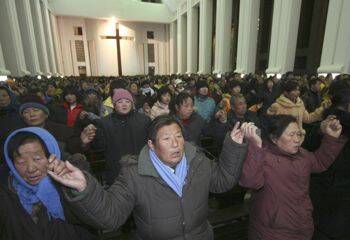In an unusually strongly worded statement, the Vatican said the recent election of new church leaders by government-controlled Catholic groups in China and the illicit ordination of a Chinese bishop have "unilaterally damaged" hopes of improved relations with China. While expressing its wish to engage in honest dialogue with Chinese authorities, the Vatican said the events were "unacceptable and hostile" and had caused "a grave loss of the trust that is necessary for overcoming the difficulties and building a correct relationship with the church for the sake of the common good." A written communique issued by the Vatican press office Dec. 17 criticized the Chinese-government-controlled National Congress of Catholic Representatives that was held in Beijing Dec. 7-9. The assembly, in which many bishops, priests, religious and laypeople were forced to take part against their will, came less than three weeks after the ordination of Father Joseph Guo Jincai as bishop of Chengde; his was the first ordination of a bishop without papal approval in four years. The Vatican condemned the methods of convoking the assembly, saying it reflected "a repressive attitude with regard to the exercise of religious liberty, which it was hoped had been consigned to the past in present-day China." Forcing people to attend the congress represented a "grave violation" of people's human rights, particularly their freedom of conscience and religion, said the Vatican. It said China's "persistent desire" to control their citizens' innermost lives, specifically matters of conscience, and to interfere with the inner workings of the church "does no credit to China."
Vatican Fires Back at Beijing Acts
Show Comments (
)
Comments are automatically closed two weeks after an article's initial publication. See our comments policy for more.
The latest from america
What is happening to migrants in courtrooms across the country is a complete embarrassment to the justice system and an affront to human dignity.
Being a kid in the summer is all about existing in an eternal present moment, a feeling of freedom and potential that it will never go away.
Father Thomas Hennen, vicar general of the Diocese of Davenport, Iowa, has been appointed Bishop of Baker, Oregon.
My writing during these past five years is filled with memories of my long journey with God over a lifetime; but very significantly, it is the expression of my prayer at this later time of my life.








